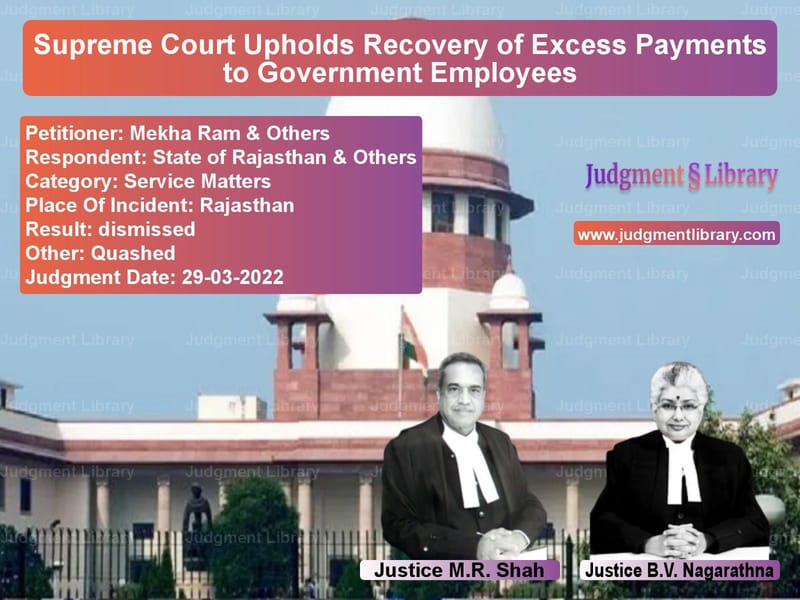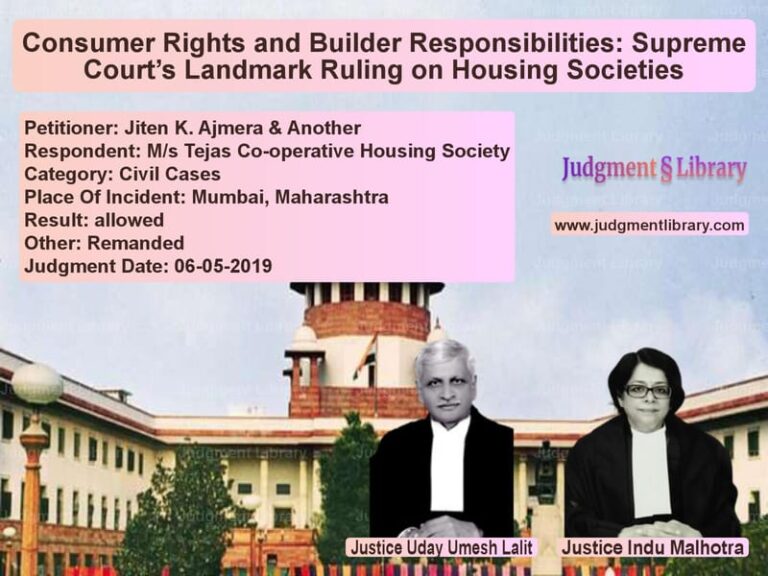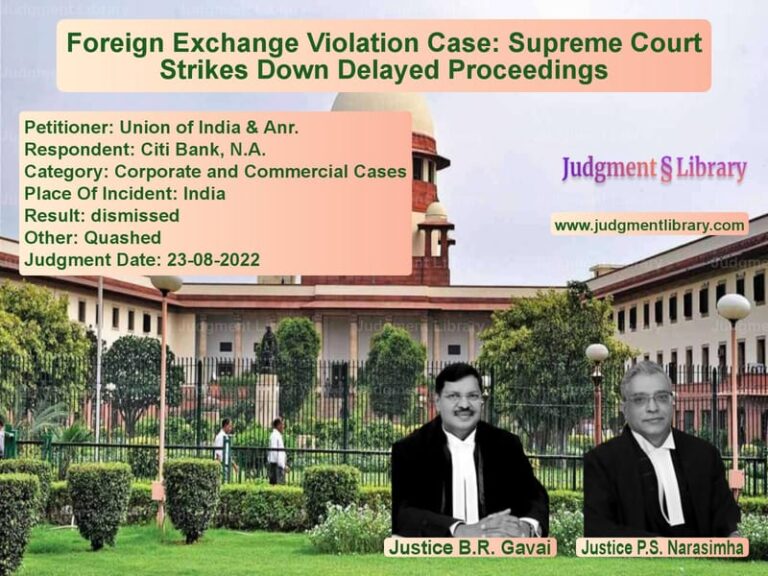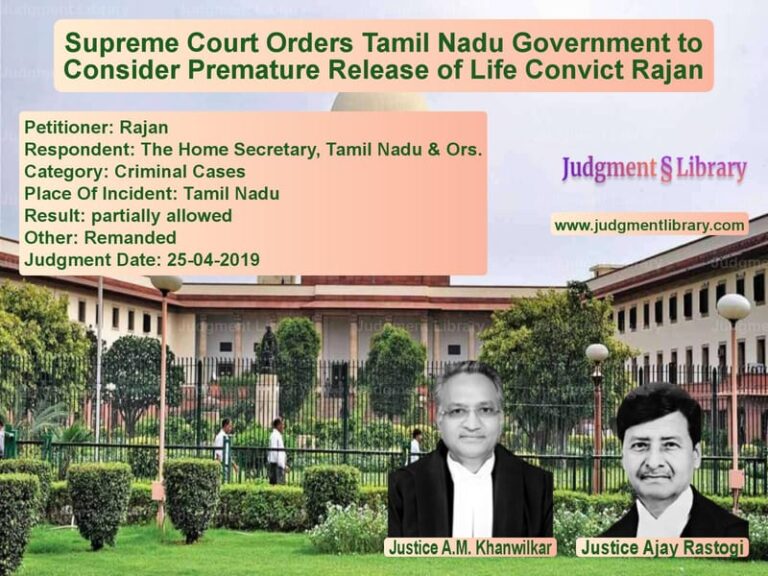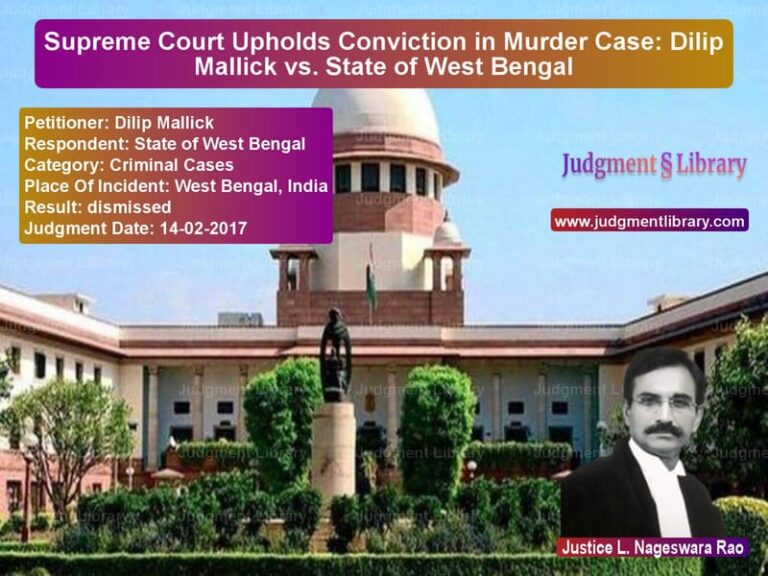Supreme Court Upholds Recovery of Excess Payments to Government Employees
The case of Mekha Ram & Others vs. State of Rajasthan & Others revolves around the issue of whether government employees who received excess payments due to a court order are liable to return those amounts after the order is overturned. The Supreme Court ruled that the principle of restitution applies, and the government has the right to recover excess payments in a structured manner.
This appeal was filed by government employees of Rajasthan who challenged the Rajasthan High Court’s decision that allowed the government to recover excess payments made to them while they were undergoing training as part of a General Nursing Training Course.
Background of the Case
The dispute arose when in-service candidates working as Auxiliary Nursing & Midwifery (ANM), Lab Technicians, Multi-Purpose Workers, Accounts Clerks, and similar posts under the Rajasthan Medical & Health Subordinate Service Rules, 1965, applied for a three-year General Nursing Training Course regulated under the General Nursing Training Course Rules, 1990.
The key legal questions in the case were:
- Whether the period spent by employees on a training course should be treated as deputation or study leave.
- Whether employees were entitled to full salary during the training period.
- Whether the government had the right to recover excess payments made due to a prior court ruling.
Arguments by the Petitioners (Mekha Ram & Others)
The petitioners contended:
- They had applied for the training course as in-service candidates and were entitled to their full salary during the period.
- Earlier, the Rajasthan High Court had ruled in their favor, allowing them to receive full pay.
- The amount received was not due to any misrepresentation on their part.
- As Class III and Class IV employees, they should be exempt from recovery as per the Supreme Court’s judgment in State of Punjab vs. Rafiq Masih (2015).
Arguments by the Respondents (State of Rajasthan & Others)
The State of Rajasthan argued:
- The petitioners were fully aware that they were availing study leave and not deputation.
- Under the Rajasthan Service Rules (RSR), study leave only entitles employees to a stipend, not full salary.
- The government paid full salaries due to a Rajasthan High Court decision, which was later overturned.
- As per the principle of restitution, any excess amount paid due to a now-invalidated court order must be returned.
Supreme Court’s Observations
The Supreme Court examined whether the recovery of excess payments was justified. The Court made the following key observations:
- The amount paid in excess was not due to a clerical mistake but was due to a now-overturned court order.
- Since the High Court ruling that led to excess payments had been set aside, the necessary consequence was to return the excess amount.
- Government employees do not have a right to retain payments received under an invalidated legal order.
- The principle laid down in State of Punjab vs. Rafiq Masih (2015) applies only to mistaken overpayments by the government and not to cases where payments were made under a judicial order later reversed.
- The principle of restitution applies, meaning a party benefiting from a court ruling must return the benefits if that ruling is overturned.
Based on these findings, the Supreme Court ruled:
- The appeal was dismissed.
- The government was entitled to recover the excess payments made to employees.
- The recovery would be made in 36 equal monthly installments deducted from employees’ salaries.
Legal Precedents Considered
The Supreme Court referred to multiple judgments on restitution and excess payments:
- State of Punjab vs. Rafiq Masih (2015): Established that recovery is impermissible from Class III and IV employees if payments were made by mistake.
- Indore Development Authority vs. Manohar Lal (2020): Reinforced the principle of restitution in cases where court rulings lead to wrongful benefits.
- South Eastern Coalfields Ltd. vs. State of M.P. (2003): Held that an interim order’s benefits must be reversed if the order is later overturned.
Impact of the Judgment
This ruling has significant implications for government employees and judicial processes:
- It establishes that government employees cannot claim a vested right over benefits granted due to an invalidated legal order.
- It reinforces that the government has the authority to recover excess payments, provided it follows a structured repayment plan.
- It clarifies that the Rafiq Masih principle applies only to mistaken payments and not to amounts paid due to court orders later overturned.
- It prevents employees from taking undue advantage of court rulings that are ultimately set aside.
By ruling in favor of the government’s right to recover excess payments, the Supreme Court reaffirmed that restitution principles must be followed to ensure fairness and prevent financial losses to the public exchequer.
Petitioner Name: Mekha Ram & Others.Respondent Name: State of Rajasthan & Others.Judgment By: Justice M.R. Shah, Justice B.V. Nagarathna.Place Of Incident: Rajasthan.Judgment Date: 29-03-2022.
Don’t miss out on the full details! Download the complete judgment in PDF format below and gain valuable insights instantly!
Download Judgment: mekha-ram-&-others-vs-state-of-rajasthan-&-supreme-court-of-india-judgment-dated-29-03-2022.pdf
Directly Download Judgment: Directly download this Judgment
See all petitions in Pension and Gratuity
See all petitions in Disciplinary Proceedings
See all petitions in Judgment by Mukeshkumar Rasikbhai Shah
See all petitions in Judgment by B.V. Nagarathna
See all petitions in dismissed
See all petitions in Quashed
See all petitions in supreme court of India judgments March 2022
See all petitions in 2022 judgments
See all posts in Service Matters Category
See all allowed petitions in Service Matters Category
See all Dismissed petitions in Service Matters Category
See all partially allowed petitions in Service Matters Category

